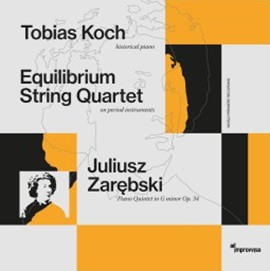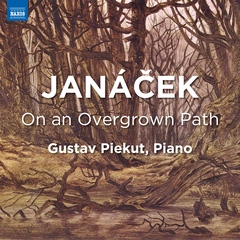Leos Janaceks intimistische Klaviermusik Auf Verwachsenem Pfade gehört zum Schönsten, was das 20. Jahrhundert in der Sololiteratur hervorgebracht hat. Es sind außerordentliche Stimmungsbilder mit großen Sehnsucht, viel Zärtlichkeit, aber auch Tragik und, wie der junge Däne Gustav Piekut in seinem Spiel unterstreicht, auch Revolte und harsche Gesten.
Im Vergleich zu Andras Schiffs Aufnahme ist diese hier weitaus lebendiger und spontaner. Piekut kann schönste Ruhe produzieren und dann wild herausfahren. Er spielt sehr langsam, und urplötzlich treibt er die Musik mit kräftiger Geste voran. Es sind diese abrupten Stimmungswechsel, dieses Aufbrausen inmitten von Nachdenklichkeit, die diese Interpretation so besonders werden lassen.
Piekut erreicht das mit dynamischen und farblichen Mitteln, und es gelingt ihm dabei, sein Spiel klanglich so zu kontrollieren, dass nie Härte auftaucht.
Er kann auch bewegende Intimität wiedergeben, etwa in Die Friedecker Muttergottes, und dann mittig sich wie angewidert auflehnen, um schließlich zu einer magischen Poesie zurückzukehren. Am Schluss vergisst der Hörer fast zu atmen.
Piekut spielt auch den Nachtrag zu Serie 2, Paralipomena, die der Komponist nicht zur Veröffentlichung freigab. Die Paralipomena-Stücke, die später als Teil von Neuausgaben zugänglich wurden, unterscheiden sich im Charakter nicht von den anderen Miniaturen des Zyklus. Piekut spielt sie genau so großartig wie alles Vorangegangene.
Kein Zweifel, so narrativ, so unmittelbar und so spannend habe ich diese Seelenbekenntnisse Janaceks kaum je gehört.
Leos Janacek’s intimate piano music On Overgrown Paths is among the most beautiful works produced in 20th-century solo literature. These are extraordinary mood pieces filled with longing and tenderness, but also tragedy and, as the young Dane Gustav Piekut emphasizes in his playing, rebellion and harsh gestures.
Compared to András Schiff’s recording, this one is much more lively and spontaneous. Piekut can produce the most beautiful calm and then burst out wildly. He plays very slowly, and then suddenly drives the music forward with powerful gestures. It is these abrupt changes of mood, this eruption in the midst of thoughtfulness, that make this interpretation so special.
Piekut achieves this with dynamic and colorful means, and in doing so, he manages to control his playing so that harshness never arises.
He can also convey moving intimacy, for example in Die Friedecker Muttergottes, and then rebel in the middle as if disgusted, only to finally return to a magical poetry. At the end, the listener almost forgets to breathe.
Piekut also plays the addendum to Series 2, Paralipomena, which the composer did not release for publication. The Paralipomena pieces, which later became available as part of new editions, do not differ in character from the other miniatures in the cycle. Piekut plays them just as magnificently as everything that came before.
Without a doubt, I have hardly ever heard Janacek’s confessions of the soul so narrative, so immediate, and so exciting.























